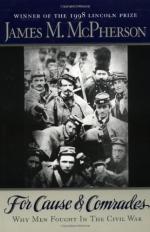
|
| Name: _________________________ | Period: ___________________ |
This quiz consists of 5 multiple choice and 5 short answer questions through Chapter 4, If I Flinched, I Was Ruined.
Multiple Choice Questions
1. A private from which state recounted an amazing amount of energy while describing the battle of Gaines Mill?
(a) Texas.
(b) Georgia.
(c) Tennessee.
(d) Pennsylvania.
2. As McPherson discusses the officer in the 4th Alabama, who was determined to fight a "black republican" leader, he reveals that leader is what relation to him?
(a) Brother-in-law.
(b) Cousin.
(c) Grandson.
(d) Uncle.
3. When an immigrant worker in a Philadelphia textile mill wrote to his father to explain his enlistment, he said if secession were allowed, the United States might end up worse than what country?
(a) Germany.
(b) Russia.
(c) Poland.
(d) Ireland.
4. Soldiers from all BUT WHICH of the following states are mentioned in the discussion of green recruits who wanted to prove their manhood through battle?
(a) Indiana.
(b) Massachusetts.
(c) Illinois.
(d) Tennessee.
5. In the discussion of the physiological effects of warfare, a chemical reaction in the adrenal gland causes which of the following to be released?
(a) Norepinephrine.
(b) Cortisol.
(c) Red blood cells.
(d) Glucose.
Short Answer Questions
1. When discussing various war memoirs, McPherson mentions that Wilbur Fisk, of the 2nd Vermont, wrote which of the following?
2. In the discussion of the officers' views on training, which of the following did a captain in the 85th New York NOT believe would get men to fight well?
3. The end of "Chapter 4: If I Flinched I Was Ruined" says Civil War soldiers came from a society that prized all BUT WHICH of the following?
4. Which of the following Generals retrieved his character during the Battle of Fair Oaks?
5. McPherson notes that at the battle of ___________________ on June 3, 1864, one New York regiment was driven by the Provost Guard at bayonet point.
|
This section contains 306 words (approx. 2 pages at 300 words per page) |

|




